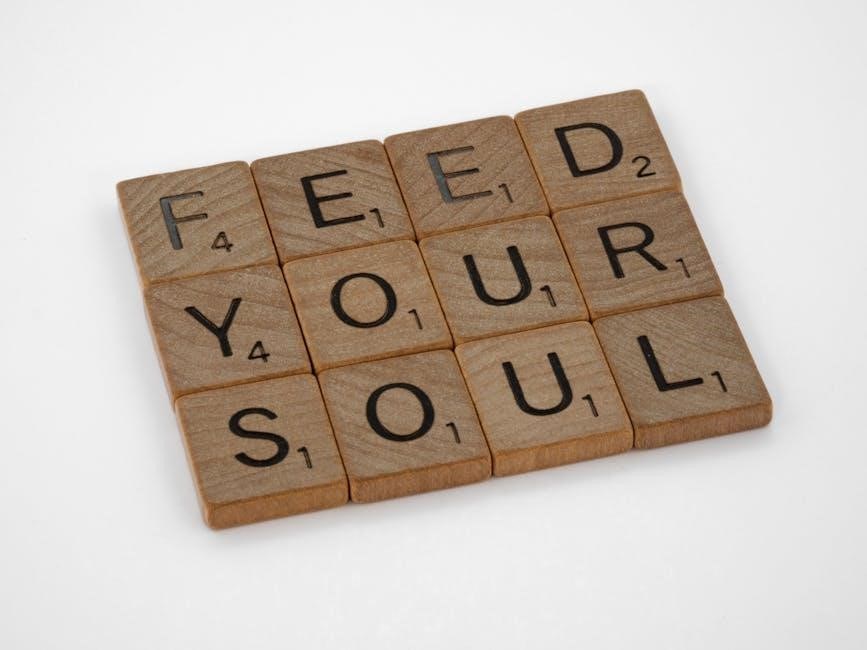Conscience is an inner moral guide directing individuals to act virtuously, shaped by reason, emotion, and personal values. It universally influences ethical decisions and behavior.
1.1 Definition of Conscience
Conscience is an inner moral guide that directs individuals to distinguish right from wrong, shaped by reason, emotion, and personal values. It acts as a faculty of the mind, motivating ethical behavior and reflecting cultural and philosophical influences. While conscience is subjective, it serves as a vital tool for self-reflection and moral decision-making, guiding actions in alignment with deeply held principles and values.
1.2 Historical Significance of Conscience as a Moral Guide
Throughout history, conscience has been a cornerstone of moral guidance, influencing ethical thought and behavior. Philosophers like Aquinas and Kant emphasized its role in moral decision-making, while religious traditions viewed it as a divine voice. Conscience has shaped societal norms, moral laws, and individual actions, serving as a universal guide across cultures and eras. Its enduring significance underscores its importance in navigating complex ethical dilemmas and fostering a sense of accountability.
1.3 The Role of Conscience in Modern Society
In contemporary times, conscience remains vital, guiding individuals through ethical dilemmas in personal and public spheres. It fosters empathy, accountability, and integrity, encouraging positive social change. Despite challenges from moral relativism, conscience continues to inspire ethical behavior, promoting justice and compassion. Its influence is evident in activism, policy-making, and personal choices, demonstrating its enduring relevance as a moral compass in a complex, evolving world.

The Nature of Conscience
Conscience is an inner guide integrating reason, emotion, and personal values, enabling individuals to discern right from wrong and act morally.
2.1 Conscience as an Inner Sense of Right and Wrong
Conscience functions as an innate moral compass, guiding individuals to distinguish between right and wrong. It is a deeply personal and intuitive faculty, often described as the “voice within.” This inner sense is shaped by one’s values, beliefs, and experiences, influencing decisions and actions. While highly subjective, conscience serves as a reliable guide for ethical behavior, prompting feelings of guilt or satisfaction based on alignment with personal moral standards.
2.2 Psychological and Neuroscientific Perspectives on Conscience
Psychological research suggests that conscience is rooted in intuition and emotion, often operating subconsciously. Neuroscientific studies link moral decision-making to brain regions like the prefrontal cortex and amygdala, which process emotions and ethical judgments. This integration of reason and emotion underscores the complex nature of conscience, highlighting its role as a dynamic guide influenced by both innate predispositions and external experiences.
2.3 The Relationship Between Conscience and Emotion
Conscience is deeply intertwined with emotion, serving as both a moral guide and an emotional mirror. Emotions like guilt and empathy often trigger conscientious responses, influencing decisions and self-reflection. While conscience can align with rational thought, its emotional roots sometimes lead to conflicts between intuition and logic. This interplay highlights the complex role of emotion in shaping moral awareness and behavior, underscoring the dynamic relationship between feeling and ethical judgment.
Philosophical Perspectives on Conscience
Philosophers like Aquinas and Kant viewed conscience as a moral guide shaped by reason and universal principles. Modern debates question its reliability and subjective nature in ethical decisions.
3.1 Aquinas and the Value of Conscience in Moral Decision-Making
Aquinas viewed conscience as a faculty of reason guiding individuals toward moral truth, aligned with natural law. He emphasized its role in discerning right from wrong, advocating for actions that maximize agape, or selfless love. While not infallible, conscience was seen as the best guide for moral decisions, reflecting divine wisdom. Aquinas stressed the importance of informing conscience through virtue and truth to ensure it remains a reliable moral compass.
3.2 Kant’s View of Conscience as a Moral Predisposition
Kant viewed conscience as an inherent moral predisposition, a natural faculty enabling individuals to recognize duty. He believed conscience operates through moral feeling, respect, and self-love, guiding ethical decisions. While not divine, it reflects universal moral principles. Kant emphasized conscience as a reliable inner guide, affirming moral obligations and promoting self-reflection. His perspective underscores conscience as a cornerstone of ethical reasoning, aligning individual actions with moral law.
3.3 Modern Philosophical Debates on the Reliability of Conscience
Modern philosophy debates the reliability of conscience, questioning its universality and objectivity. Critics argue that conscience is subjective, shaped by culture, emotion, and personal biases, leading to conflicting moral judgments. While some view it as a fallible guide, others contend that conscience, when informed by reason and education, can serve as a trusted moral compass. The debate highlights the tension between conscience as a personal moral intuition and its potential to align with universal ethical principles.
Religious and Cultural Interpretations of Conscience
Religious traditions view conscience as a divine inner guide, while cultural perspectives emphasize its role in moral judgment shaped by societal values and beliefs, universally.
4.1 The Catholic Church’s Teaching on Conscience
The Catholic Church teaches that conscience is a natural faculty of reason directing individuals to do good and avoid evil. It bears witness to moral actions, creating feelings of guilt or peace. The Church emphasizes the importance of forming a well-informed conscience through education and moral teaching, ensuring it aligns with divine law and promotes agape, or selfless love, as the ultimate moral guide in decision-making and behavior.
4.2 Hindu and Buddhist Views of Conscience as an Inner Guide
In Hinduism, conscience is viewed as an inner divine presence guiding moral actions, often referred to as the “invisible God” within. Buddhists see conscience as an intuitive moral awareness linked to ethical conduct and the pursuit of dharma. Both traditions emphasize the role of conscience in promoting self-reflection and righteousness, encouraging individuals to align their actions with universal moral principles and achieve spiritual harmony. This inner guide is seen as a universal truth, transcending cultural boundaries.
4.3 Cultural Variations in the Perception of Conscience
Cultural perspectives on conscience vary widely, reflecting diverse moral frameworks. Some societies view conscience as a universal guide, while others emphasize its subjective nature. For instance, certain cultures prioritize communal harmony over individual moral judgment, while others focus on personal accountability. These variations highlight the complex interplay between cultural values and moral decision-making, influencing how conscience is perceived and applied in different global contexts. This diversity underscores the dynamic nature of conscience as a cultural and ethical construct.

Conscience as a Guide to Ethical Behavior
Conscience serves as a personal guide for ethical behavior, helping individuals navigate moral dilemmas by distinguishing right from wrong. It acts as an inner compass for decision-making, shaped by reason and emotion, guiding actions toward virtuous outcomes.
5.1 The Role of Conscience in Resolving Moral Dilemmas
Conscience plays a pivotal role in resolving moral dilemmas by guiding individuals to act in accordance with their inner sense of right and wrong. It serves as a dynamic process, integrating reason and emotion to navigate complex ethical situations. Through self-reflection and moral scrutiny, conscience helps individuals weigh competing values and principles, leading to decisions that align with their deeply held beliefs. Its reliability, however, depends on education and the cultivation of virtues, ensuring it remains a trustworthy guide in uncertain circumstances.
5.2 Strengths and Limitations of Conscience as a Moral Guide
Conscience is a powerful moral guide, offering insights into right and wrong through personal values and ethical intuition. Its strength lies in its ability to provide immediate, emotionally resonant guidance, fostering integrity and moral accountability. However, its limitations include potential subjectivity, as it can be shaped by cultural biases or incomplete information. Additionally, emotional influences may cloud judgment, leading to flawed decisions. Thus, while conscience is a vital guide, it requires critical examination and education to enhance its reliability in complex ethical scenarios.
5.3 The Impact of Education and Scrutiny on Conscience
Education and scrutiny significantly refine conscience, enhancing its role as a moral guide. By fostering critical thinking and ethical reasoning, education helps align conscience with universal moral principles. Scrutiny ensures that decisions are not merely emotional but also rationally sound. This dual process strengthens discernment and promotes ethical behavior, enabling individuals to navigate complex moral dilemmas effectively. Ultimately, education and scrutiny empower conscience to serve as a more reliable and principled guide in shaping virtuous actions and decisions.
Historical Development of Conscience as a Moral Concept
Conscience evolved from ancient philosophical ideas to religious doctrines, shaping moral frameworks; It transitioned from a divine voice to a rational, human faculty, reflecting societal and intellectual shifts.
6.1 Ancient Greek and Roman Views of Conscience
In ancient Greece, conscience was linked to reason and self-awareness, with philosophers like Plato and Aristotle emphasizing the inner voice guiding moral actions. The Romans, influenced by Stoicism, viewed conscience as a natural moral sense, integral to human dignity. These early perspectives laid the groundwork for conscience as a universal ethical guide, bridging reason and emotion in moral decision-making and societal norms.
6.2 The Evolution of Conscience in Medieval and Renaissance Thought
In the Middle Ages, conscience was deeply intertwined with Christian theology, viewed as a divine spark guiding moral decisions. Scholastics like Thomas Aquinas emphasized conscience as a rational faculty aligning human actions with divine law. During the Renaissance, humanism expanded the concept, with thinkers like Petrarch and Erasmus advocating for individual moral responsibility and the harmonization of faith and reason. This period saw conscience evolve from a strictly religious to a more holistic ethical guide.
6.3 Conscience in the Context of the Enlightenment
The Enlightenment emphasized reason and individual moral autonomy, reshaping the concept of conscience. Thinkers like Rousseau and Kant highlighted conscience as a rational, innate guide aligning with natural law. Rousseau viewed it as a divine spark, while Kant emphasized its universality and moral imperative. This period saw conscience evolve into a secular, ethical compass, influencing ideas of human rights and democratic values, and becoming a cornerstone of modern moral philosophy and individual responsibility.

Conscience and Ethical Decision-Making
Conscience serves as a moral compass, guiding individuals through complex ethical dilemmas by integrating reason, emotion, and personal values to discern right from wrong in decision-making processes.
7.1 The Process of Moral Deliberation Guided by Conscience
Moral deliberation guided by conscience involves introspective reasoning, emotional awareness, and value-based analysis. It begins with recognizing a moral conflict, followed by evaluating actions against personal and universal ethical standards. Conscience acts as an internal compass, prompting individuals to reflect on potential consequences and align decisions with their deeply held beliefs. This process fosters integrity and ensures actions resonate with one’s moral identity, promoting ethical and principled choices.
7.2 Case Studies of Conscience in Action
Case studies reveal how conscience guides individuals in ethical dilemmas. Whistleblowers, like Edward Snowden, expose corruption despite personal risks, driven by their moral obligation to truth. Civil rights activists, such as Rosa Parks, acted on conscience to challenge unjust systems, inspiring societal change. These examples illustrate how conscience compels individuals to stand against wrongdoing, even in the face of adversity, demonstrating its power to shape ethical decisions and foster justice in real-world scenarios.
7.3 The Integration of Reason and Emotion in Conscience-Based Decisions
The integration of reason and emotion in conscience-based decisions is crucial for ethical judgment. Conscience involves a dynamic interplay between rational reflection and emotional intuition, guiding individuals to align actions with moral principles. While emotions provide moral sensitivity, reason ensures decisions are logically sound and ethical. This balance enables individuals to navigate complex dilemmas effectively, making conscience a powerful tool for ethical decision-making when both elements are harmoniously integrated and guided by education and scrutiny.

The Role of Conscience in Personal Growth
Conscience fosters self-reflection, enabling individuals to align actions with moral values, promoting personal growth and the cultivation of virtues necessary for ethical and fulfilling lives.
8.1 Conscience as a Catalyst for Self-Reflection
Conscience serves as a powerful catalyst for self-reflection, prompting individuals to examine their actions and intentions. By listening to this inner moral guide, people gain insight into their values and beliefs, enabling them to make amends for past mistakes and strive for personal improvement. Through this reflective process, conscience aids in fostering emotional and moral development, encouraging individuals to align their behavior with their ethical principles and aspirations for a virtuous life.
8.2 The Relationship Between Conscience and Virtue
Conscience and virtue are deeply interconnected, as conscience guides individuals toward actions aligned with moral principles, fostering the development of virtues like honesty, compassion, and integrity. Virtue, in turn, strengthens the resolve to follow one’s conscience, creating a harmonious cycle of ethical behavior. This relationship underscores the importance of cultivating both conscience and virtue to achieve a morally upright and fulfilling life, where inner guidance aligns with outward actions of goodness and character.
8.3 Overcoming Guilt and Shame Through Conscience
Conscience plays a vital role in addressing guilt and shame by prompting self-reflection and moral accountability. When individuals act against their conscience, feelings of guilt arise, signaling a need for corrective action. Shame, similarly, reflects a disconnect from personal values. By acknowledging these emotions and aligning actions with conscience, individuals can foster personal growth, repair relationships, and restore inner peace. This process highlights conscience as a tool for redemption and ethical renewal, guiding individuals toward a more virtuous path in life.

Conscience in the Digital Age
Conscience in the digital age involves navigating moral dilemmas influenced by technology. Social media shapes perceptions, while AI raises ethical questions, challenging traditional moral frameworks and personal values.
9.1 The Influence of Technology on Moral Decision-Making
Technology significantly influences moral decision-making by shaping emotions and reasoning. Social media algorithms can amplify certain moral viewpoints, while AI systems introduce biases into ethical choices. This dual role of technology challenges individuals to balance their conscience with the digital world’s evolving norms, ensuring that moral decisions remain guided by personal values rather than mere technological dictates.
9.2 Conscience and Artificial Intelligence
Artificial Intelligence raises questions about the role of conscience in machine decision-making. While AI lacks human emotions, it can simulate ethical reasoning based on programmed principles. This challenges the notion of conscience as a uniquely human trait, sparking debates on whether AI can truly possess moral agency or merely mimic ethical behavior, complicating the relationship between technology and moral guidance.
9.3 The Role of Social Media in Shaping Conscience
Social media profoundly influences conscience by exposing users to diverse moral perspectives. Platforms can amplify ethical awareness but also spread misinformation, leading to moral confusion. Algorithms prioritize sensational content, sometimes overshadowing nuanced ethical deliberation. This digital environment challenges individuals to critically discern right from wrong, making social media both a tool for moral enlightenment and a potential corruptor of conscience, highlighting the need for discernment in the digital age.

Challenges to the Authority of Conscience
Moral relativism, determinism, and cultural perceptions question the universality of conscience as a reliable guide, highlighting its subjective nature and potential limitations in ethical decision-making.
10.1 Moral Relativism and the Subjectivity of Conscience
Moral relativism challenges the authority of conscience by asserting that right and wrong vary across cultures and individuals. This perspective argues that conscience, shaped by personal and cultural values, is inherently subjective. While conscience serves as a personal guide, its moral judgments may conflict with universal ethical standards. For instance, differing views on issues like abortion highlight how conscience can lead to opposing ethical decisions, questioning its role as an objective moral authority.
10.2 The Debate Over Conscience and Determinism
The debate over conscience and determinism questions whether moral choices are truly free or predetermined by external factors. Determinism argues that all actions, including those guided by conscience, are the result of prior causes, challenging the notion of free will. This perspective suggests that conscience, while influential, may not be an entirely reliable guide, as its judgments could be shaped by factors outside individual control. The tension between determinism and moral responsibility complicates the role of conscience in ethical decision-making.
10.3 Criticisms of Conscience as a Universal Guide
Conscience is criticized for its subjectivity and variability across individuals and cultures; While it serves as a personal moral compass, its reliability as a universal guide is questioned due to differing ethical frameworks and biases. Critics argue that conscience can lead to conflicting moral judgments, as what is deemed right by one may be wrong by another. This subjectivity undermines its role as an objective guide for ethical behavior in diverse contexts and global scenarios.
The Future of Conscience as a Moral Guide
The future of conscience lies in education, nurturing ethical awareness, and integrating it into global decision-making to address contemporary moral challenges effectively.
11.1 Enhancing Conscience Through Education
Education plays a crucial role in refining conscience by fostering critical thinking and moral awareness. By integrating ethical teachings into curricula, individuals can develop a stronger sense of right and wrong, enabling them to navigate complex moral dilemmas with confidence. This educational foundation not only enhances personal decision-making but also cultivates a society governed by empathy, integrity, and a collective commitment to ethical behavior.
11.2 The Role of Conscience in Global Ethics
Conscience serves as a universal moral compass in global ethics, transcending cultural boundaries. It promotes unity by encouraging individuals to prioritize shared human values over conflicting interests. By guiding actions toward compassion and justice, conscience fosters cooperation and mutual understanding among diverse populations. This collective moral awareness is essential for addressing global challenges, ensuring ethical decisions that benefit humanity as a whole and uphold the principles of fairness and equality worldwide.
11.3 The Potential of Conscience to Address Contemporary Moral Issues
Conscience holds immense potential in resolving modern moral dilemmas by fostering empathy and ethical reasoning. It encourages individuals to reflect on societal issues like inequality and environmental degradation, promoting actions aligned with universal values. By integrating reason and emotion, conscience can unify diverse perspectives, offering a moral framework to navigate complex challenges. This inherent guide within each person can inspire collective efforts toward justice, compassion, and sustainability, ultimately shaping a more ethical and harmonious global society.
